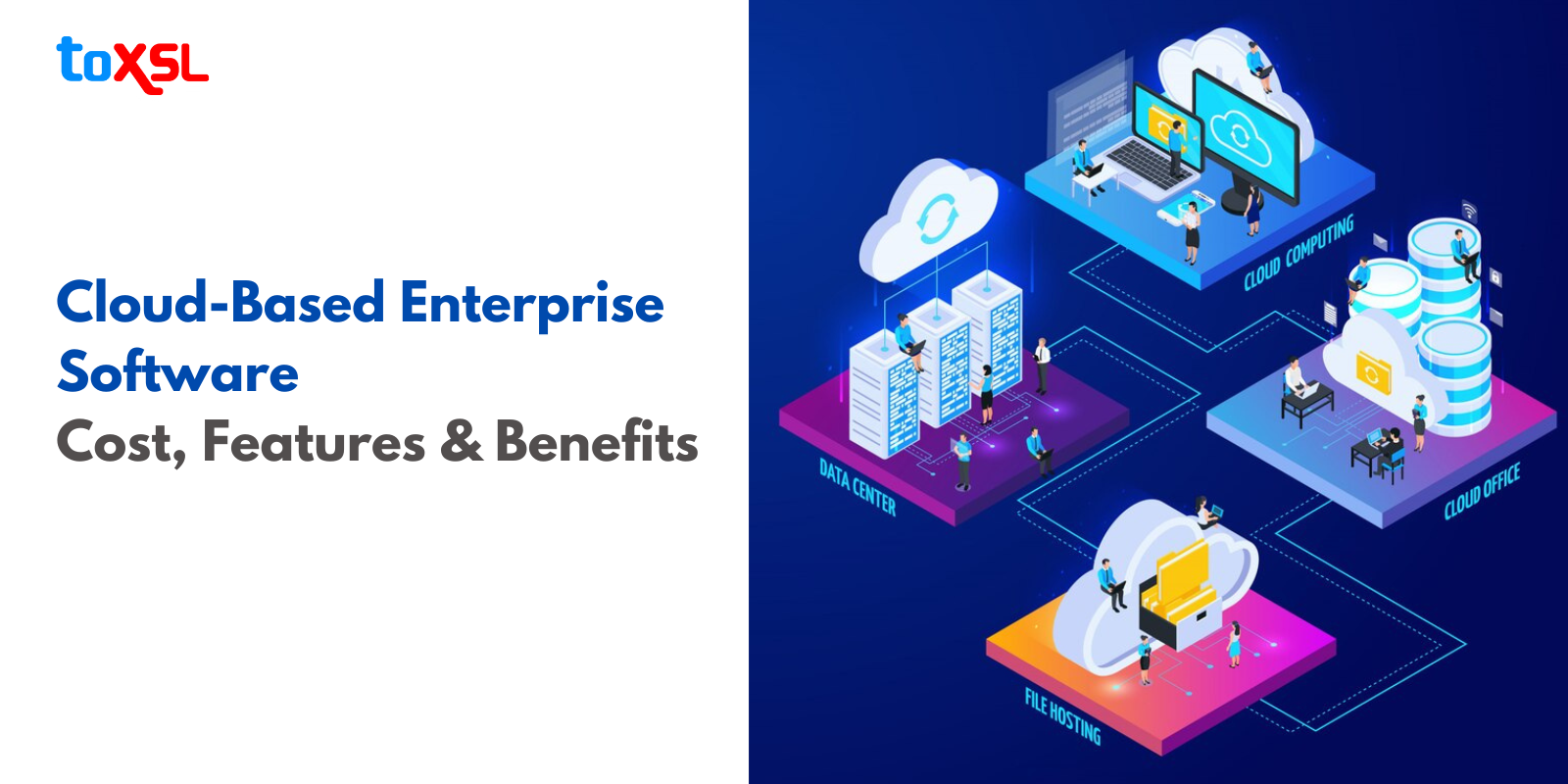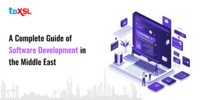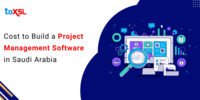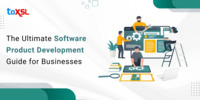- Feb 10, 2025
- Software Development
- 1223
Share this post on:

According to statistics, the global ERP market is estimated to reach $96 billion by 2032. Large enterprises hold 39% of the ERP market share, however, the small enterprises are expected to grow at an annual rate of 7% by the end of 2025.
Nowadays, businesses are constantly looking for more efficient solutions, making Enterprise Resource Planning software their priority. If you want to streamline business across various departments such as finance, human resources, manufacturing, and supply chain management, among others. Traditionally, ERP systems were deployed on-premises, raising a significant investment in hardware and IT infrastructure. However, with time businesses have seen advancements in cloud technology, giving rise to cloud-based ERP services. Cloud-based ERP offers lots of benefits to businesses over on-premises ERPs.
The Shift Towards Cloud-Based Enterprise Software in 2025
Cloud-based ERP software is becoming a norm among businesses. The way companies use ERP is changing, mainly because technology keeps getting better and businesses need their IT to be quicker and more adaptable. Dealing with rules, managing worldwide supply chains, and keeping up with changing markets is tough, so Cloud-ERP's flexibility is becoming a must-have.
A big reason for this change is that traditional systems just can't keep up anymore. On-site ERP systems are robust, expensive to maintain, and hard to scale as business grows. This becomes a big problem when companies try to expand to other countries or start using new tech like the Internet of Things and Artificial Intelligence.
Plus, as everyone goes digital, it gets important to have up-to-the-minute data analysis. This helps businesses to predict what's coming, and connect all the various parts of the business smoothly. However, cloud-based software is perfect for this because it has features such as automatic data analysis, which can predict when equipment needs fixing, smart automation tools, and helps businesses scale easily.
Why Move to Cloud-based Enterprise Software? Benefits and Reasons for Cloud ERP
A few reasons to move to cloud-based enterprise software, are as follows:
Lower Costs: Getting started with cloud ERP is way cheaper than setting up a traditional system on your servers. And the savings don't stop there! After deployment, you'll probably spend less money overall each month. For small businesses, this can be a game-changer, as it costs less for maintenance fees Maybe you've always wanted an ERP system but couldn't justify the huge upfront cost of the old-school, on-premises kind. Cloud ERP makes it possible!
Access to the Advanced Tech: Technology is changing fast. Cloud ERP offers features such as advanced data analysis, artificial intelligence (AI), and machine learning (ML) to help you make better predictions, find hidden opportunities, improve how you work, and develop brand-new products. However, getting hands-on with this kind of tech requires a huge investment. You need powerful computers, a complex data system, and people with specialized skills. This puts it out of reach for most companies. Cloud ERP is here to help. It's a faster and cheaper way to use these cutting-edge technologies. AI, and ML, are developed right into the service.
Security: Some businesses doubt putting their financial data in the cloud, mainly because of security. However, cloud-based ERP systems are more secure than the systems you keep on your computers. Cloud technology ensures protection by using encryption, multi-factor authentication, and other crucial security measures.
Implementation: Cloud solutions can be set up and launched faster than traditional systems. This is because the cloud ERP company is responsible for getting everything up and running. This reduces downtime and allows businesses to quickly adapt to changing market conditions, meeting growing customer demand.
Customization: Customizing traditional ERP systems is expensive and time-consuming. You need to combine the right features, integrate third-party applications, and upgrade your software and hardware. This is especially difficult for companies that don't have a dedicated IT staff with ERP expertise. This can make full customization impossible, hindering your business goals.
Cloud ERP solutions make customization easier and less expensive. The cloud ERP company handles the customizations, so you don't need to invest in additional hardware, software, or ERP expertise. You can design a system that perfectly fits your unique circumstances with minimal investment.
Accessibility: Cloud ERP systems are accessible from any device (laptops, smartphones, tablets) with an internet connection and a browser, making it possible to input, compile, and collaborate on data from anywhere. This allows different departments or business units to work across company campuses or countries, accessing a single instance of the software without needing a dedicated VPN as with on-premises systems. A cloud ERP allows key decision-makers to stay connected when traveling or outside of regular work hours and gives businesses a larger talent pool to tap into since they can more easily hire remote workers.
Scalability: Cloud ERP systems offer rapid and almost unlimited scalability, which is impossible with traditional ERP systems. Scaling on-site systems requires upgrading or reworking multiple pieces of hardware to meet increasing needs, a costly and complicated task. The flexible design of cloud solutions makes it possible to increase or decrease resource usage as needed, allowing the ERP to grow with the business. It can easily expand to accommodate a rush of new hires, the acquisition of another business, or the addition of new product lines or business units.
Cloud ERP is also less expensive to implement across multiple locations because configuration can be done remotely. This means that hardware investments are minimal and there’s no need to send an implementation team to every location.
Types of Cloud ERP Software
Cloud ERP allows businesses to manage and automate their operations. This includes managing finance, HR, and more. Cloud-based ERP offers flexibility and scalability for businesses to adapt to the changing needs of businesses. Let us discuss the various types of cloud ERP software:
- Multi-tenant SaaS: Multi-tenant SaaS is one of the most common forms of cloud ERP deployment. This model helps various customers share the same software application but do not interact with each other's data. However, the vendor manages updates and maintenance centrally.
- Single-tenant SaaS: Single-tenant SaaS model offers each customer a dedicated instance of the software application, which is hosted on shared or private infrastructure by the vendor. It offers more control over data security and privacy than multi-tenant models.
- Public Cloud: Public cloud ERP solutions are deployed on a public infrastructure. These software are managed by third-party providers (like AWS or Microsoft Azure). However, multiple organizations use this shared resource environment, but each has its own secure partition for data.
- Private Cloud: In this model, the cloud ERP solution runs in a dedicated environment that is either physically located within the company's premises or hosted externally, but isolated for use by one organization only.
- Hybrid Cloud: Hybrid cloud ERP solutions combine elements of both private and public clouds, offering a flexible mix of resources and environments that can adapt to specific business needs. A company can choose a hybrid model if it wants to leverage the scalability and cost benefits of a public cloud while maintaining a few processes or sensitive data in its secure private environment.
Cost to develop Cloud ERP Software
The cost to develop ERP software ranges from $10,000 to $100,000, depending on various business needs. Numerous factors decide the cost of cloud ERP software, including the complexity of the app, customization, upgrades, support, maintenance, development team, and geo-location, among others.
Conclusion: Embracing the Future of Cloud-based ERP Solutions
Companies have realized the using cloud-based business software like Cloud-ERP. This is because they're realizing how helpful it is. These systems can make businesses work better, save money, and come up with new ideas using advanced data analysis. This gives them an advantage in today's digital world.
If your company is planning to move to the cloud, it's important to have a good plan. This plan should consider both the technical side and how it will affect your employees and company structure. Working with experienced software companies can help. They can guide you through each step, making sure your move to the cloud goes smoothly and successfully.
ToXSL Technologies is a leading cloud ERP development company, renowned for offering the best ERP solutions to businesses globally. With over 13 years in business, we have successfully helped businesses streamline their operations with the best ERP solutions globally. If you want to learn more about Cloud-based ERP solutions, get in touch with our experts today.









